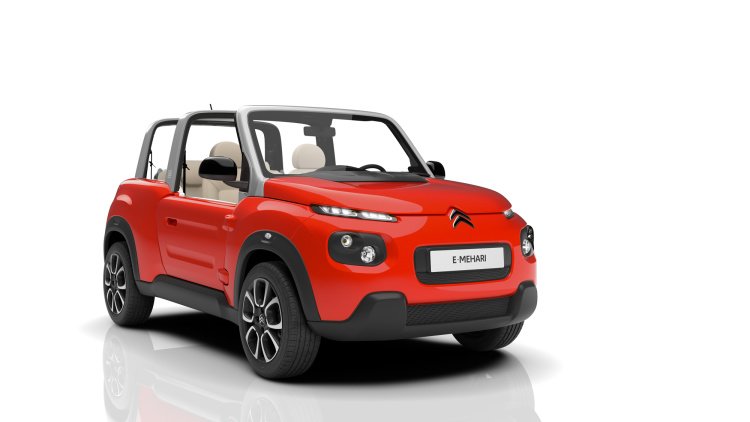Citroen E-Mehari is Wild Enough to Go Into Production

It will be officially unveiled today at the company's Paris headquarters and will begin rolling from the factory floor as early as Spring 2016.
Putting aside the badge-engineered C-Zero, a Mitsubishi i-MiEV, this four-seater is Citroen's first production electric vehicle. As one might guess, it is meant to be more of a halo effort than a high-volume seller.
With a maximum 50-kW (67-horsepower) output and a top speed of only 110 kph (68 miles per hour), it can't reach the highest speed limit in its homeland of 130 kph (81 mph). And, boasting only 200 km (124 miles) of city-driving range, it couldn't make the trip from Paris to the nearest sea-side village without stopping for a charge. For a lot of electrics, a single charging session might not seem like a big deal, but the E-Mehari is super pokey about pumping electrons, with a full eight hours required to fill the 30-kWh lithium metal polymer (LMP) battery from empty.
Its thermoformed plastic bodywork is resilient to rust and small dings (just like the original Méhari), the weather-friendly interior allows for beach sand, sunscreen residue, and other detritus of a leisurely lifestyle to be hosed from its seats and floorboards. The soft, friendly lines of its exterior have a modern feel, though with elements that harken back to the original, which the company produced for 20 years, until 1988.
Curiously, this will not be the only electric vehicle with beach-bound, sans-roof styling built at the PSA Peugeot Citroen plant in Rennes in 2016. The slightly smaller Bolloré Bluesummer, with which the E-Mehari shares its electric drivetrain, is also supposed to launch within the same timeframe. While that EV is expected to mostly be used in car-sharing mobility programs like Autolib (which Bolloré operates), the E-Mehari will be available for general sale.
Related News


